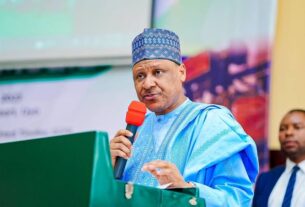On Wednesday, the COP28 president, in his closing remarks, said the world needed to find a new way by following their “North Star.”
“…we have found that path,” he added, noting that “We have worked very hard to secure a better future for our people and our planet. We should be proud of our historic achievement.”
Mr Al-Jaber said he promised to deliver a different sort of COP that would be all inclusive and that he has delivered.
“Everyone came together from day one. Everyone united, acted and delivered,” he said.
Throughout the COP28 process this year, Mr Al-Jaber on several occasions reiterated that he will work with his team to deliver “a plan that is led by science” and to define a new way for this and future COPs, based on the inclusion of diverse peoples and elevating the needs of the Global South.
“It is a balanced plan that tackles emissions, bridges the gap on adaptation, reimagines global finance and delivers on loss and damage,” Mr Al Jaber said.
He explained that the newly adopted text is built on common ground and that it is strengthened by inclusivity and reinforced by collaboration.
In what has been described as an unprecedented reference to transitioning away from all fossil fuels, the COP28 presidency hinted that the deal adopted will enable the world to fulfil its net zero target by 2050.
Also, it is a significant step forward in the expectations for the next round of Nationally Determined Contributions (NDCs) by encouraging “economy-wide emission reduction targets.”
Among several commitments captured in the adopted text dubbed, “the UAE Consensus,” the world leaders recognised the need for deep, rapid and sustained reductions in greenhouse gas emissions in line with 1.5°C pathways and calls on Parties to contribute to the following global efforts, in a nationally determined manner:
a)Tripling renewable energy capacity globally and doubling the global average annual rate of energy efficiency improvements by 2030.
(b) Accelerating efforts towards the phase-down of unabated coal power;
(c) Accelerating efforts globally towards net zero emission energy systems, utilising zero- and low-carbon fuels well before or by around mid-century;
(d) Transitioning away from fossil fuels in energy systems, in a just, orderly and equitable manner, accelerating action in this critical decade, so as to achieve net zero by 2050 in keeping with the science;
(e) Accelerating zero-and low-emission technologies, including, inter alia, renewables, nuclear, abatement and removal technologies such as carbon capture and utilisation and storage, particularly in hard-to-abate sectors, and low-carbon hydrogen production;
(I) Accelerating and substantially reducing non-carbon-dioxide emissions globally, including in particular methane emissions by 2030;
(g) Accelerating the reduction of emissions from road transport on a range of pathways, including through development of infrastructure and rapid deployment of zero-and low-emission vehicles;
(h) Phasing out inefficient fossil fuel subsidies that do not address energy poverty or just transitions, as soon as possible;
According to the 21-page text document, Parties are expected to do all the aforementioned and more by taking into account the Paris Agreement and their different national circumstances, pathways and approaches.
The world leaders also committed to building momentum behind the financial architecture reform agenda, recognising the role of credit rating agencies for the first time, and calling for a scale up of concessional and grant finance.
Parties also adopted a new and specific target to triple renewables and double energy efficiency by 2030, upon recognising the need to significantly scale up adaptation finance beyond the doubling to meet urgent and evolving needs.
Outside the Global Stocktake, the initial win recorded at the just concluded COP28 was the delivery of a historic negotiated outcome to operationalize Loss and Damage.
Official tally posted on the COP28 X handle indicated that over $792 million of early pledges have been secured within the past two weeks of the COP negotiation. Likewise, the event sees the commitment of over $85 billion to accelerate climate actions globally.
This, they said, provides a framework for the Global Goal on Adaptation (GGA), and institutionalising the role of the Youth Climate Champion to mainstream youth inclusion at future COPs.
But despite this, climate change analysts have posited that the agreement reached in Dubai has its flaws. However, it commemorates a historic moment in the climate fight and probably signals the beginning of the end for dirty fuels polluting the planet. PREMIUM TIMES.





